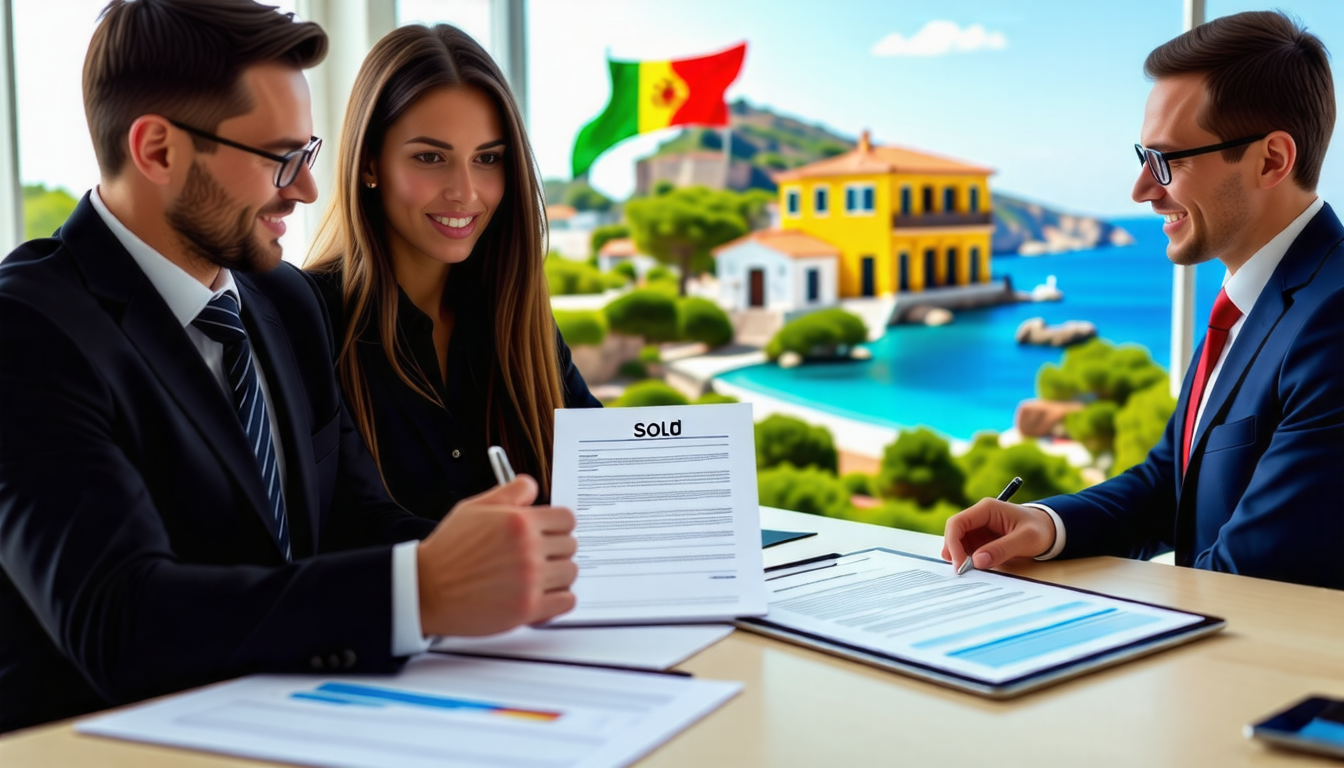|
IN BRIEF
|
Purchasing property in Spain can be an exhilarating opportunity, but understanding the legal requirements is crucial for a smooth transaction. Spain presents a welcoming landscape for foreign buyers, allowing them to invest in residential, commercial, or even land properties without many restrictions. However, navigating the legal landscape requires familiarity with specific processes and documentation, such as acquiring a NIE number—the essential identification for foreigners. In 2024, clarity on the various steps involved in acquiring property is key to avoiding potential pitfalls. From understanding tax obligations to verifying building permits, being informed will not only facilitate a successful purchase but also ensure compliance with local regulations. This guide aims to illuminate the essential aspects of buying property in Spain.

Purchasing property in Spain involves several legal requirements that can vary slightly depending on whether you are a European Union citizen or a non-EU citizen. Becoming familiar with these requirements is crucial to ensure a smooth transaction. Understanding what is needed can help avoid potential issues and ensure compliance with Spanish regulations.
Identification Number for Foreigners (NIE)
The first step for any foreigner looking to purchase property in Spain is obtaining a NIE number (Número de Identificación de Extranjero). This identification number is essential for any financial transactions in Spain, including buying property. The NIE is a unique identifier assigned to non-nationals and is mandatory for foreign investors.
To apply for a NIE, you must visit a police station or a consulate in your home country. In some cases, you may also need to provide documents such as a passport, proof of residence, and a completed application form. Once you obtain your NIE, you will have the legal right to buy property in Spain.
Bank Account and Financial Documentation
Setting up a bank account in Spain is another requirement for property purchase. A Spanish bank account allows you to transact in euros, pay local taxes, and manage utility payments efficiently. Most banks will require your NIE, proof of income, and identification to open an account.
Additionally, preparing financial documentation is vital. You may need to provide evidence of funds, such as bank statements or mortgage pre-approval if you’re not purchasing the property outright. To secure a mortgage as a non-resident, many banks require you to demonstrate stable income and may ask for up to 50% of the property’s value as a deposit.
Legal Representation
Engaging a solicitor who specializes in Spanish property law is strongly advisable. A lawyer can guide you through the purchasing process, ensuring all legal requirements are met. They can also investigate the property’s legal status, checking for any debts or disputes associated with it.
Your lawyer will assist in drafting contracts, completing the necessary paperwork, and ensuring compliance with local regulation. This support is particularly crucial for foreign buyers unfamiliar with the Spanish legal system.
Due Diligence
Performing due diligence is critical when buying property in Spain. This process includes verifying the property’s legal standing, such as ownership status and existing debts. Your lawyer will conduct checks with the Land Registry to ensure that the seller is the lawful owner and that the property is free from liens or mortgages.
Additionally, you must obtain a “nota simple,” which is a summary of the property’s registry details. This document contains essential information such as the property’s history, the owner’s name, and any potential claims against it.
Purchase Agreement (Contrato de Arras)
Your lawyer will review the Purchase Agreement, ensuring that it includes necessary clauses that protect your interests. The contract should also outline penalties if either party fails to fulfill their obligations.
Public Deed (Escritura Publica)
The transaction culminates in a Public Deed (Escritura Publica), which must be signed in the presence of a notary public. This document officially transfers ownership from the seller to the buyer. The notary will confirm that the necessary steps have been taken and that the transaction is lawful.
Once signed, the notary registers the deed with the local Land Registry, finalizing the transfer of ownership. It is important to note that you will also be responsible for certain fees associated with this process, including notary fees and registration fees.
Payment of Taxes and Fees
When purchasing property in Spain, various taxes and fees need to be accounted for. The most significant tax is the Property Transfer Tax (Impuesto de Transmisiones Patrimoniales, ITP), which varies by region but typically ranges from 6 to 10% of the purchase price. This tax is due when buying a resale property.
In the case of new properties, you will be liable for VAT (Value Added Tax) at a rate of 10%. Additionally, there are other fees, such as notary fees, registration fees, and legal fees, which should be budgeted carefully as they can average around 3-5% of the purchase price.
Residency Considerations and Golden Visa
For non-EU citizens, purchasing property valued at €500,000 or more can make you eligible for a Golden Visa, which facilitates residency in Spain. The Golden Visa program encourages foreign investment and provides a pathway to residency for property buyers.
This visa allows you to reside in Spain and travel within the Schengen Zone. However, it is essential to comply with any additional requirements, such as maintaining the property and fulfilling tax obligations while residing in Spain.
Understanding the 90-Day Rule
Foreign buyers should also be aware of the 90-day rule that governs the duration of stay in Spain without a visa. Non-EU citizens can stay in Spain for up to 90 days within a 180-day period without obtaining a residence visa. However, longer stays necessitate additional visas or residency permits, which should be considered before finalizing the property purchase.
Final Steps and Moving In
After completing the legal and financial checks, signing the Public Deed, and paying the required fees, you can take possession of the property. Prior to moving in, ensure that you register the property with local authorities, as this is necessary for establishing utility services such as electricity and water.
Furthermore, it is advisable to inform your new local municipality about the change in ownership. This step is also essential for tax assessment purposes and ensures that you receive any necessary documentation regarding property taxes.
Additional Considerations for Foreign Buyers
Buying property in Spain can be an excellent investment. However, it is paramount to be aware of additional layers of responsibilities that come with property ownership, such as ongoing maintenance and community fees if the property is part of a homeowners’ association.
Moreover, understanding the local market dynamics and potential pitfalls will empower you as a buyer. Engaging with real estate professionals and legal experts can provide a well-rounded perspective on navigating the property landscape in Spain effectively.
Resources for Foreign Buyers
Various resources are available to assist foreign buyers in Spain. Websites like Alta Vista provide comprehensive guides and market insights. Additional information about the legal process can be found at Bright Tax or Spain Property.
By being informed and adequately prepared, foreign property buyers can navigate the Spanish real estate market with confidence and enjoy the benefits of owning property in such a vibrant and appealing country.

When considering purchasing property in Spain, it’s crucial to understand the legal requirements involved. To initiate the process, foreigners must obtain a NIE (Número de Identificación de Extranjero), which is an essential identification number for tax purposes and property ownership. This can be procured through a Spanish consulate or directly in Spain.
Additionally, opening a bank account is necessary for transactions, including handling taxes and utilities. It is important to note that the Spanish government welcomes foreign investment, resulting in no restrictions on buying commercial, residential, or land. For those interested in securing a Golden Visa, purchasing property valued at least €500,000 is a pathway to residency.
Another critical aspect is the payment of VAT, commonly known as IVA, at a rate of 10% for new property purchases. Moreover, ensuring that the property has all necessary building permits and complies with local regulations is essential to avoid any legal complications down the line. Hiring a knowledgeable lawyer who specializes in Spanish real estate is highly recommended to navigate these legal steps smoothly and securely.

Legal Requirements for Purchasing Property in Spain
When considering a property purchase in Spain, it is crucial to understand the legal requirements that govern the transaction. Fortunately, Spain does not impose significant restrictions on foreign buyers, making it an attractive destination for real estate investment. The first essential step is obtaining a NIE number, which is a tax identification number assigned to non-residents. This number is necessary for all official transactions in Spain, including buying property.
Once you have your NIE, you will need to open a Spanish bank account to facilitate the financial transactions related to the purchase. It is recommended to engage a reputable local lawyer who specializes in real estate to guide you through the legal process. They will ensure that all documentation is properly prepared and that the property has the necessary building permits and complies with local regulations. This is vital to avoid future legal complications.
Additionally, it’s important to conduct a thorough due diligence check before finalizing any purchase. This includes verifying the property’s ownership, ensuring there are no outstanding debts or legal claims against it, and assessing the current market value. Foreign buyers should also be aware of the applicable taxes, such as the Value Added Tax (VAT) and other fees associated with the purchase, which can significantly impact the overall cost.
Finally, it is advisable to have a bilingual notary public to oversee the signing of the property deed, ensuring that all parties understand the contracts and obligations involved. By following these legal protocols, foreigners can successfully navigate the Spanish property market and make informed decisions.
What are the necessary documents required to purchase property in Spain?
R: The key documents include a valid passport, a foreigner’s identification number (NIE), proof of funds or mortgage approval, and a Spanish bank account. Additionally, you will need to verify property ownership and obtain necessary building permits.
Do I need a lawyer when buying property in Spain?
R: While it is not legally required, hiring a lawyer is highly advisable. A legal expert can assist you with the purchase process, ensure that all documents are in order, and help avoid potential pitfalls.
Can foreigners easily buy property in Spain?
R: Yes, there are no restrictions on foreign ownership of property in Spain. The Spanish government actively encourages foreign investment, making the process relatively straightforward for non-residents.
What is the role of the NIE in purchasing property in Spain?
R: The NIE (Número de Identificación de Extranjero) is a mandatory identification number for foreigners involved in any economic activities in Spain, including property purchases. It is crucial for carrying out legal transactions and registering the property.
Are there any taxes I need to be aware of when buying property in Spain?
R: Yes, several taxes apply, such as the Value Added Tax (VAT) of 10% on new properties and the property transfer tax (ITP) for resale properties, which varies based on the region and property value.

